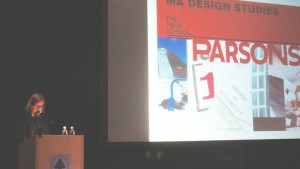On leave this academic year, Professor Susan Yelavich took time away from her sabbatical project on fiction and design to deliver a lecture on design and leisure this September at the invitation of the Warsaw Academy of Fine Arts as part of a conference on design as activity. A summary of her lecture “Product(ive) Leisure” can be found here:

Professor Yelavich at the FAIR Design Conference in Warsaw, Poland.
Leisure would seem to be exempt from design’s interventions. The word implies unstructured pleasure from activities chosen and pursued at will; whereas design aims to reconfigure experiences and mediate them through systems, places, and things. Even design that positions itself as a catalyst—like a hiking trail that is more means than end—exerts a measure of control and configuration. Admittedly, there are leisure activities like meditation that are not dependent on things, but even they require space, whether found or purpose-built. So, counterintuitive as it may seem, leisure is not exempt from, but rather open to, design.
The challenge to design, in an age of leisure marketing, leisure destinations, even higher education degrees in leisure, is how to enhance leisure without being overly deterministic. Just as Adorno cautioned that the art of giving gifts is all but lost, we are now in danger of ceding leisure to the industries that produce (and design) environments that script the escape of pressure and the pursuit of pleasure.
Furthermore, with digital technologies that support both work (paid) and leisure (unpaid) within the same devices, we must ask if design should do more to preserve the frisson of contrast between the obligatory and the optional. Alternatively, we might also consider whether life would be richer if the distinction between leisure and work disappeared by virtue of being interwoven by design. In both cases, we must ask who works and who pays for our leisure and whether that work and the economies it supports are exploitive or nourishing.
Understanding the relationship between the scripted and the unscripted, between time as a unit of measure and time as experience, and whose time and labor are entailed in shaping those experiences are prerequisites for designers addressing leisure today. For whether it is pursued socially—community gardening, playing sports—or in individual activities—reading, daydreaming—leisure is incomplete unless it allows for genuine agency and the possibilities of meandering and serendipity. Otherwise, leisure runs the risk of eliciting its nemesis: anxiety.
Tags:
conference,
susan yelavich,
warsaw

Professor Yelavich addresses FAIR Design Conference at Warsaw Academy of Fine Arts
On leave this academic year, Professor Susan Yelavich took time away from her sabbatical project on fiction and design to deliver a lecture on design and leisure this September at the invitation of the Warsaw Academy of Fine Arts as part of a conference on design as activity. A summary of her lecture “Product(ive) Leisure” can be found here:
Professor Yelavich at the FAIR Design Conference in Warsaw, Poland.
Leisure would seem to be exempt from design’s interventions. The word implies unstructured pleasure from activities chosen and pursued at will; whereas design aims to reconfigure experiences and mediate them through systems, places, and things. Even design that positions itself as a catalyst—like a hiking trail that is more means than end—exerts a measure of control and configuration. Admittedly, there are leisure activities like meditation that are not dependent on things, but even they require space, whether found or purpose-built. So, counterintuitive as it may seem, leisure is not exempt from, but rather open to, design.
The challenge to design, in an age of leisure marketing, leisure destinations, even higher education degrees in leisure, is how to enhance leisure without being overly deterministic. Just as Adorno cautioned that the art of giving gifts is all but lost, we are now in danger of ceding leisure to the industries that produce (and design) environments that script the escape of pressure and the pursuit of pleasure.
Furthermore, with digital technologies that support both work (paid) and leisure (unpaid) within the same devices, we must ask if design should do more to preserve the frisson of contrast between the obligatory and the optional. Alternatively, we might also consider whether life would be richer if the distinction between leisure and work disappeared by virtue of being interwoven by design. In both cases, we must ask who works and who pays for our leisure and whether that work and the economies it supports are exploitive or nourishing.
Understanding the relationship between the scripted and the unscripted, between time as a unit of measure and time as experience, and whose time and labor are entailed in shaping those experiences are prerequisites for designers addressing leisure today. For whether it is pursued socially—community gardening, playing sports—or in individual activities—reading, daydreaming—leisure is incomplete unless it allows for genuine agency and the possibilities of meandering and serendipity. Otherwise, leisure runs the risk of eliciting its nemesis: anxiety.
Tags: conference, susan yelavich, warsaw